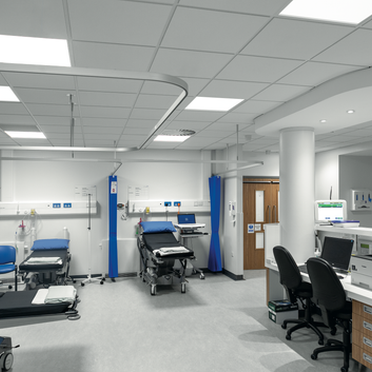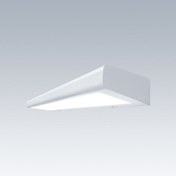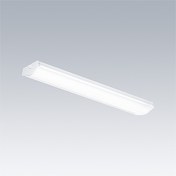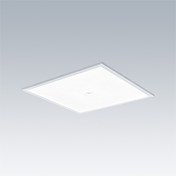Ward areas
Products
- Lamp efficacy
Lamp efficacy
Ensuring the lamp efficiently converts electricity into light (lm/W).
- Ballast classification
Ballast classification
Controlling the electricity supply to the lamp (Energy Efficiency Index).
- Luminaire distribution
Luminaire distribution
Controlling light emission using optics which bend and shape the light to the correct location.
- System efficacy
System efficacy
Combining optical and thermal control within the luminaire (luminaire lm/W).
- Presence/absence detection
Presence/absence detection
Presence: Lights automatically turn on/off with movement. Absence: Lights automatically turn off and must be manually switched on.
- Daylight detection
Daylight detection
Artificial lighting which responds to the natural light conditions.
- Constant illuminance
Constant illuminance
A function designed to produce correct light levels for the duration of the maintenance period.
- Task-scene setting
Task-scene setting
Allowing the user to set scenes and adapt the lighting to different tasks.
- Timed off
Timed off
Automatic cut-off can be installed to turn all lights off during unoccupied hours.
- Task lighting
Task lighting
Lighting task areas with the correct amount of light.
- Zoning of lighting
Zoning of lighting
Lighting is zoned according to area use.
- Maintenance schedule
Maintenance schedule
Maintenance must be performed in response to product age, performance and environment.
- Waste light
Waste light
Eliminating waste light which does not hit the intended target.
- Reflectance
Reflectance
Taking advantage of light which is reflected from the surface within the space.
- Visible smart metering
Visible smart metering
Results of actions can be quickly seen as increased or decreased energy use to encourage responsible energy consumption.
Hospital wards are critical spaces that need suitable and considered lighting.
Around beds, lighting needs to be comfortable so that it doesn't negatively affect patients who are sleeping or recovering, while also allowing nursing staff to be able to complete their care safely. Thorn’s Cavell bedhead has been designed with the patient in mind with low glare comfortable lighting combined with various lighting level requirements stipulated in CIBSE: SLL Lighting Guide 2: Lighting for Healthcare Premises (2019).
Thorn also has a range of ward nightlight options in the Chalice downlight range and the College surface luminaire range.
Click on the products above to discover the features of these luminaires and where they can best be installed.




